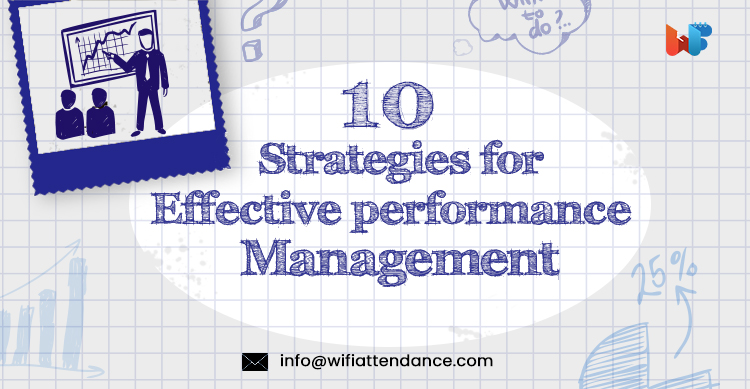Management – the term in itself speaks of a tremendous burden of responsibilities that may not be suitable for a normal professional.
This phenomenon requires one to assemble a successful team and regulate their operations for higher productivity.
Management applies to all businesses, no matter if it is small or big. That is why, it is of high significance.
Read Also: Performance Appraisal – All You Need To Know
But, here’s the catch:
A business cannot flourish without the role of an effective manager to guide the team. If you are responsible for managing a team of your own at your company, then this post will help you with the right strategies for effective business management.
1. Be An Effective Delegate
Management is all about administering various responsibilities upon your team members, progressively. This is the first rule that you need to keep in mind while managing your team.
Delegation opens new ways of polishing the skills of your employees. If you keep on doing every member’s job yourself at your company, then it would not be productive. Eventually, you will exhaust yourself.
Learn to manage the team by assigning the tasks properly based on their skills. Try to provide each team professional with a task that he or she can complete with confidence and passion.
If two or more members have the same skills for a project, then you can team them up to complete the task at a much faster rate. That is how you should strategize your management decisions.
2. Be A Team Leader
A leader acts as the fuel to ignite flames within the team members. With a leader-cum-manager’s inspiration, the subordinates will be motivated to complete assigned tasks with a new sense of responsibility.
Try to understand and know each of your subordinates individually. You do not have to be too personal while conversing with them, but do maintain a healthy relationship to show them that you are interested in speaking to them.
Your team members will understand how you are making effort to create a connection with them. They will feel motivated to follow your plans.
3. Show Productivity
As a manager at your firm, you are bound to show results, right? But, without an effort, you may never achieve the level of an effective business manager. So, to deal with the situation:
- Focus on managing your tasks.
- Get out of your comfort zone to understand how you can benefit your company in a better way.
- Plan your moves for assigning projects skillfully so that you know how the output should turn out.
- Be aware of the pros and cons related to the tasks as well. You may never know what issue hits you while a project is in progress, such as team members on sick leave, reduction in project deadlines, etc.
Your commitment to achieve excellence in your work will reward you as an effective business manager.
4. Don’t Be Reckless With Your Decisions
A manager also needs to be aware of making careful decisions. Time comes when there is a need to decide whether you are taking up a responsibility or not. If you can handle it, say YES. But, if you cannot do it, and are already packed with work, then just say NO.
Here’s why it is important:
Imagine a situation where you have 3-4 projects under you. Your senior asks a team of managers, including you, to volunteer taking another project. Just to stay in your senior’s good books, you volunteer to take another project.
You got the project but at the cost of loading another layer of pressure upon you and your team. And, later you may realize that you do not even have a relevant team to accomplish the new project.
This will make your team feel frustrated. So, be careful what you decide about various situations while answering as an effective manager.
5. Consider The Opinions Of Your Team Members
Asking for suggestions and opinions from your team members can help to show them that you care for their views too. Surely, there are multiple ways to complete a task.
Read Also: 13 Ways To Motivate Your Team Members for Better Performance
You may have your own way to do it. But, it is possible that some of your team members are also having their own suggestions to speed up the work efficiently. Thus:
- Freely ask them what are their suggestions related to a specific task.
- Involve them in the project at a similar level as you.
- Act as a colleague working together, instead of just being a stubborn boss.
- Generate their interest in the project by caring to know what they have to say about it.
This strategies for Effective Performance Management will help you raise awareness for the project and help your team perform better under your guidance and leadership.
6. Personalize Training Methods To Improve Your Team’s Performance
A good level of professional exercise can improve the skills of your team. For this, you need to first understand what level of skills each of your team members have in them.
Learn about their ideas, fears, weaknesses, and strengths. Based on your collected data, create various training methods that can improve their productivity at the office.
You may need to show some efforts here, as each of your team members may not be fit for the same training method. Learn to personalize the training programs so that they can feel motivated to perform in the training at their own pace.
7. Be Transparent With Your Team
You will undoubtedly look for honesty and a submissive nature from your employees. But, maintaining a prudent level of transparency will also ask of you to do the same for them first. Being transparent to your team will ensure a strong relationship of trust between you and your team.
Remember that you are at a higher position than them, so your management should be fair for all members. Plus, you should never lie to them about any professional situation. Your employees may fail to respect you if you are not indulging in an honest conversation with them.
With your efforts of transparency and corporate companionship, your team will learn to be true to you as well. So, learn to be transparent with them and win their hearts.
8. Reward The Ones Who Deserve Recognition
Every now and then, you will have to acknowledge the hard work done by your employees.
Rewarding them for their efforts will ensure that they have the motivation to work even harder for you. Their attitude towards you will also be appreciative.
You can choose from a multitude of options to acknowledge their performance, like offering a bonus or a promotion. Never do this while they are with you in your cabin privately.
Do it openly in front of other team members so that they can also witness the fruits of hard work. It can encourage them to work at a similar or better pace to complete their tasks and improve their performance.
9. Clarify The Goals Before Assigning A Project To Your Team
As a manager, your team relies on your judgment. Thus, it is your responsibility to make sure that all goals related to a project are clear to them. Note that each team member may have a different level of intellect.
You want your team members to know how you envision a goal for a project. But, it is possible that they are not on the same page as you. So, make them aware of it first. After that, assign them the project section that they need to accomplish to achieve high productivity.
10. Carry Regular Evaluations To Judge The Skills Of Your Employees
You need to evaluate their skills and see how team members are progressing with each day. Learn their strengths and weaknesses to see where they are lacking and where they are excelling.
Read Also: 13 Ways To Motivate Your Team Members for Better Performance
Prepare the trainings as mentioned in one of the previous strategies for Effective Performance Management. Learning how they will indulge in the tasks is important for effective business management.
Final Notes:
Being an effective business manager involves a number of key strategies. The ones mentioned above are some of the main ones that you ought to consider for becoming a good business manager. Follow them and be successful in your career.



